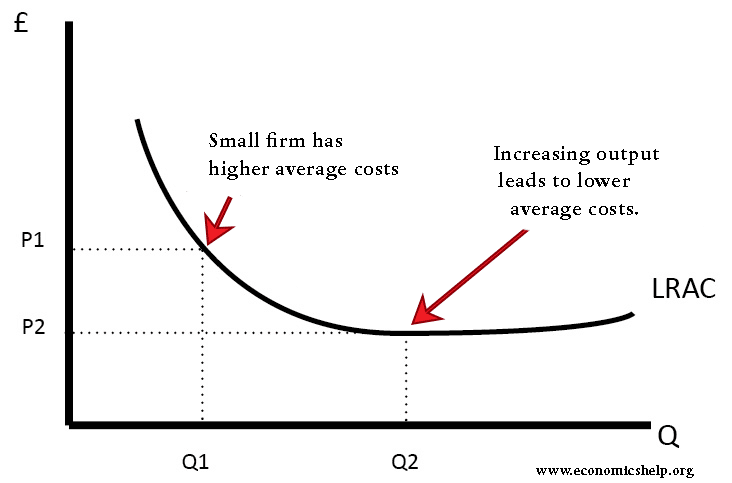- Economies of scale occurs when increased output leads to lower long run average costs.
Diagram of Economics of Scale
Note Economies of Scale occurs upto Q2. After Q2 dis-economies of scale starts to occur
Basically as a firm expands it receives increasing returns to scale. To understand why economies of scale occur it is useful to think about large companies and how they benefit from their size.
Fixed Costs and Economies of Scale
Fixed Costs is the key to understanding economies of scale. To build a modern car factory make require investment of £25 million. This is just for all the technology, machines and building. Therefore, if this car factory produced 1 car a year, its average fixed cost would be £25million. If 10,000 cars were built the average fixed cost would fall to £250 each.
Clearly the more that you produce, the lower your average costs. This is why we don’t see many small car firms – they just wouldn’t be able to compete because they cannot share the economies of scale of bigger firms.
Creating Economies of Scale
Some firms actually try to increase economies of scale in their industry. Why do Unilever and Proctor & Gamble spend so much on advertising soap powders? The reason is that it makes it more difficult to enter the industry. A new firm would have to spend a large amount on advertising (fixed cost) to enter the industry. Therefore, we get marketing economies of scale. There is no point in spending £10 million a year on advertising unless we can get a pretty good return on sales. The marketing economies of scale makes it difficult for new firms (the advertising is also a sunk cost)
Bulk Buying Economies of Scale
Another common reason for economies of scale is buying in bulk. To give a very obvious example, if you buy a tin of baked beans the price may be 40p. If you buy a pack of 4 you will pay perhaps £1.20 (average price 30p) If you buy 24 from a wholesaler you may pay an average price of 20p. One reason for the cheaper price is that there are economies of scale in buying larger amounts. The transaction costs for buying 200 items is not much higher than buying 1 item. Basically, the more you buy the more efficient it is.
External Economics of Scale
Most economies of scale are internal i.e. they benefit the individual firm. However, some economies of scale accrue to the whole industry. Average costs fall for firms because the industry grows in size. e.g. if there are more computer firms in silicon valley all benefit from lower average costs. See more at: external economies of scale
Related


GOOD DEFINATION OF ECONOMIES OF SCALE